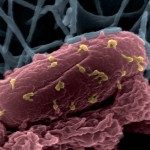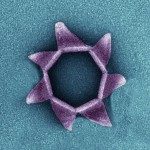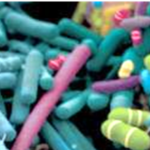Link to Pubmed [PMID] – 30763535
Cell Host Microbe 2019 02;25(2):210-218
The intestinal microbiota is intimately linked to human health. Decoding the mechanisms underlying its stability in healthy subjects should uncover causes of microbiota-associated diseases and pave the way for treatment. Bacteria and bacteriophages (phages) are the most abundant biological entities in the gastrointestinal tract, where their coexistence is dynamic and affixed. Phages drive and maintain bacterial diversity by perpetuating the coevolutionary interactions with their microbial prey. This review brings together recent in silico, in vitro, and in vivo work dissecting the complexity of phage-bacteria interactions in the intestinal microbiota, including coevolution perspectives. We define the types of dynamics encountered in the gastrointestinal tract and the parameters that affect their outcome. The impact of intestinal physiology on phage-bacterial coevolution is analyzed in the light of its potential contribution to the relationship between the microbiota and human health.




